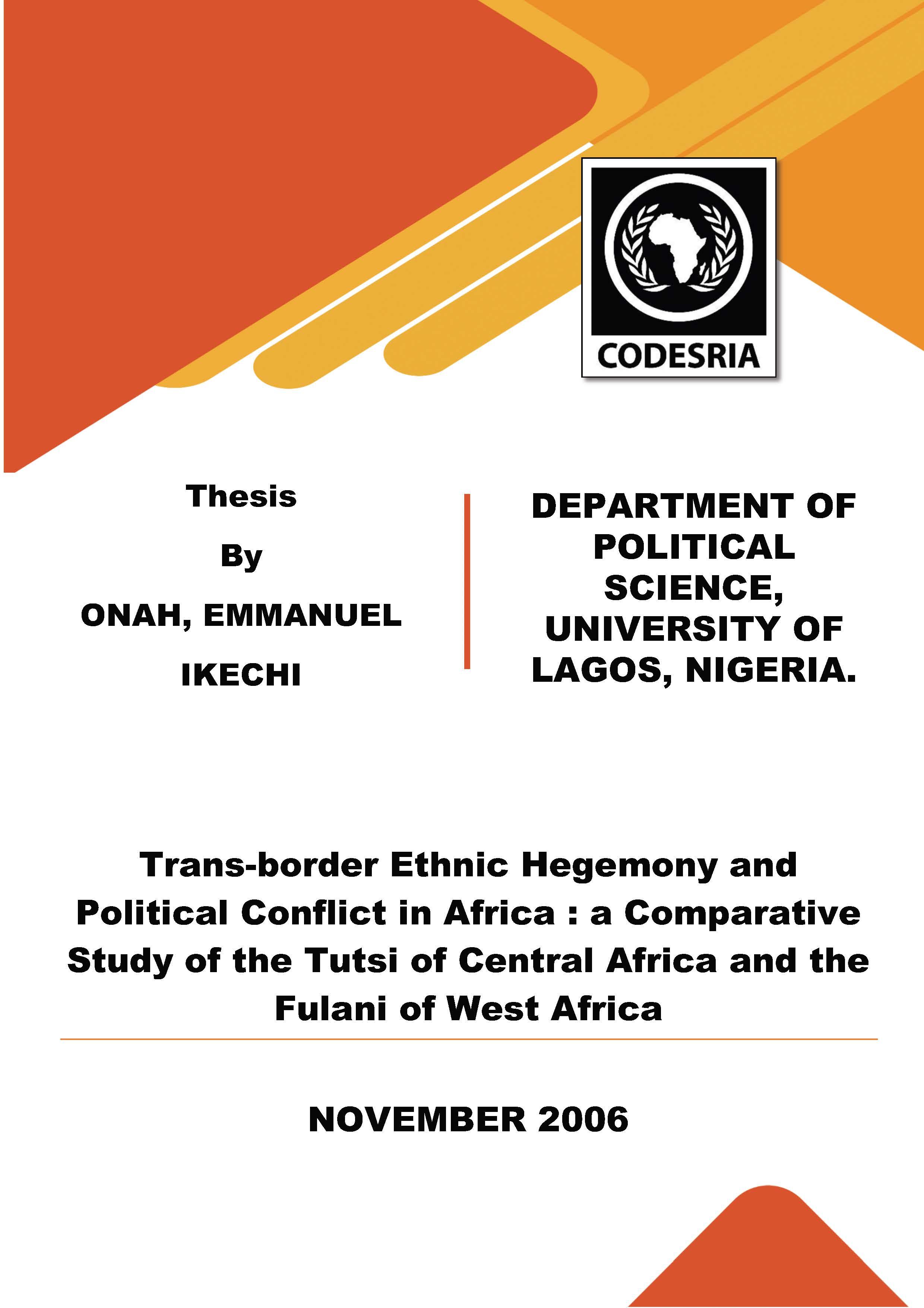Trans-border Ethnic Hegemony and Political Conflict in Africa: a Comparative Study of the Tutsi of Central Africa and the Fulani of West Africa
Mots-clés :
Trans-border Ethnic, Political Conflict, Africa, the Tutsi, the FulaniSynopsis
The phenomenon of the trans-border ethnie group in Africa owes its origin to the partition of the continent by the European colonial powers in theyears following the Berlin Conférence of 1884-5. But despite partition, members of the fractions of trans-border ethnie groups in Africa have continued to relate with each other across the borders, such that events and conflict in one country involving a fraction of the trans-border ethnie group soon draw in the other fractions in other countries on the side of their kin.
In the years following colonialism, the various ethnie groups on the continent, including those partitioned across countries, were expected to integrate into the states to which they belonged. This was not however, the case as the various new states were soon ravaged by ethnicity. As a resuit, members of the various ethnie groups that constituted the states became more attached to their ethnie groups, in opposition to other such groups in the states, and often to the détriment of the very states.
The Tutsi and the Fulani are two trans-border ethnie groups partitioned into the countries of Central Africa and West Africa respectively. As is shown by this study, the manner of partition of the two groups was such that their fractions constitute minorities in almost ail the countries where they appear. It has also been seen that the respective fractions did not have much access to power and other socio-economic opportunities in the various countries where they live, moreso in the case of the Tutsi in Central Africa. Using the Political Systems theory in conjunction with the theory of Hegemony and the Conflict theory as the frameworks for this study, it was found that group solidarity among the fractions of the two groups respectively was high and attachmènt to the respective states was low.
The fractions showed a tendency to agitate for power in their respective countries. But state power is sought only as a means of maintaining group hegemony, as a way of ensuring group survival and as a way of maintaining group contact across borders. Hegemony however brings about conflict. Thus, no sooner is a move towards hegemony made by members of the fractions of
the minority trans-border ethnie group than the various countries and régions where they live degenerate into conflict and violence, as the other ethnie groups lise in résistance to the hegemony of the fractions of the trans-border group.
The solution to these conflicts emanating from the tendency of trans border ethnie groups to institute hegemonies over their countries and régions of abode lies, not in keeping their fractions apart, as the various countries where they live have continued to do, or in keeping the members of the fractions away from power, as other ethnie groups in the various countries
have continued to do. Instead, policies must be deliberately put in place that will ensure the continued but harmonious intercourse of the fractions of trans-border ethnie groups across borders, as well as ensure that members of the fractions have relative access to power and the other socio-economic opportunities available in the various countries where they live.
Téléchargements
Références
Clapham, C. (1999). Boundaries and States in the New Alhcan Order. In D. C. Bach (Ed.). Régionalisation in Africa^ Oxford: James Currey.
Coleman, J. S. & Roseberg, C. (Eds.). (1964). Political Fardes and National Intégration in Tropical Africa. Berkeley and Los Angeles: University of California Press.
Collins, R. (1975). Conflict Sociology: Toward an Explanatory Science. New York: Académie Press.
Correy, A. & Joireman, S. F. (2004). Retributive Justice: The Gacaca Courts in Rwanda. AfricanAffairs, 103.
Fkeh P P (1996) Political Minorities and Historically Dominant Minorities in N'igeri^ History and Politics. In G. Gyediran (Ed.). Go.amance and Development in Nigena (pp. 33-63). Ibadan: Agbo Areo Publishers.
Enemuo, F. C. (1991, September). The State, Civil Unease and the Challenge of Peace- Building in Africa. Africa Notes, pp. 1-5.
Etzioni, A. . (1965). Political Unification. New York: Holt, Rinehart and Winston.
Falola, T. & Ihonvbere, J. (1985). The Rise and Fall of Nigeria's Second Republic, 1979-84. London: Zed Books Ltd.
Fisher 1 (1996). Hutu and Tutsi Ask: Is a Unified Rwanda Possion. Retrieved October 17, 2G05, from http//www.Globalpolicy.org/security/issues/Rwanda9.html






